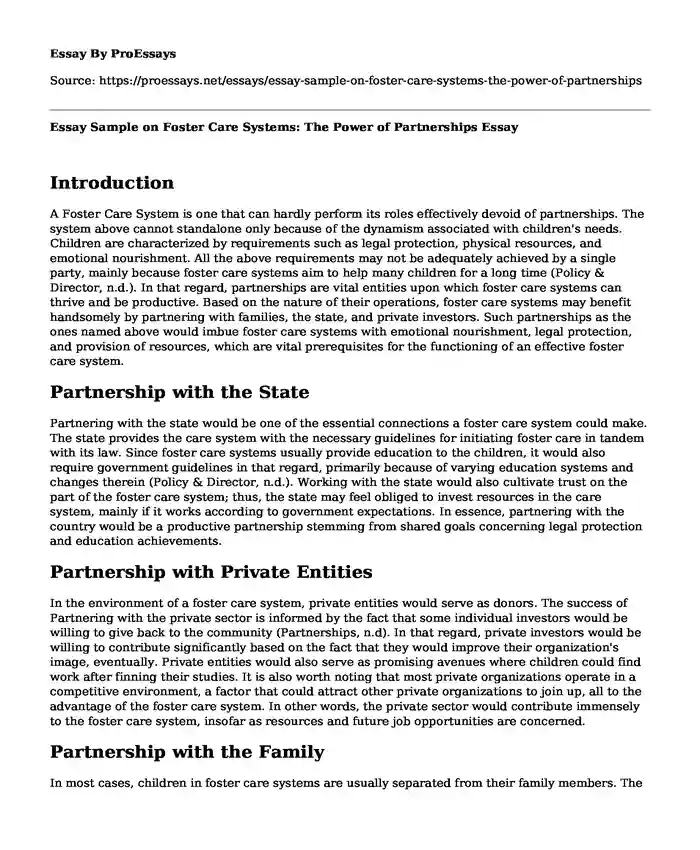Introduction
A Foster Care System is one that can hardly perform its roles effectively devoid of partnerships. The system above cannot standalone only because of the dynamism associated with children's needs. Children are characterized by requirements such as legal protection, physical resources, and emotional nourishment. All the above requirements may not be adequately achieved by a single party, mainly because foster care systems aim to help many children for a long time (Policy & Director, n.d.). In that regard, partnerships are vital entities upon which foster care systems can thrive and be productive. Based on the nature of their operations, foster care systems may benefit handsomely by partnering with families, the state, and private investors. Such partnerships as the ones named above would imbue foster care systems with emotional nourishment, legal protection, and provision of resources, which are vital prerequisites for the functioning of an effective foster care system.
Partnership with the State
Partnering with the state would be one of the essential connections a foster care system could make. The state provides the care system with the necessary guidelines for initiating foster care in tandem with its law. Since foster care systems usually provide education to the children, it would also require government guidelines in that regard, primarily because of varying education systems and changes therein (Policy & Director, n.d.). Working with the state would also cultivate trust on the part of the foster care system; thus, the state may feel obliged to invest resources in the care system, mainly if it works according to government expectations. In essence, partnering with the country would be a productive partnership stemming from shared goals concerning legal protection and education achievements.
Partnership with Private Entities
In the environment of a foster care system, private entities would serve as donors. The success of Partnering with the private sector is informed by the fact that some individual investors would be willing to give back to the community (Partnerships, n.d). In that regard, private investors would be willing to contribute significantly based on the fact that they would improve their organization's image, eventually. Private entities would also serve as promising avenues where children could find work after finning their studies. It is also worth noting that most private organizations operate in a competitive environment, a factor that could attract other private organizations to join up, all to the advantage of the foster care system. In other words, the private sector would contribute immensely to the foster care system, insofar as resources and future job opportunities are concerned.
Partnership with the Family
In most cases, children in foster care systems are usually separated from their family members. The separation with family members comes as something involuntary, but circumstances contrive the child to grow and develop away from them. It is essential for the foster care system to retain that connection with family members, most importantly, because of cultural enhancement and emotional development (Partnerships, n.d). Family members would also be better placed in claiming children's rights if their children's rights are violated. Constant visits from family members would potentially provide children with individualized care as children would have already developed trust in their relatives. Family members would, therefore, enable the foster care system to children's issues with specificity. Again, children may be required to reunite with their family members at the end of their stay in the foster care system.
Conclusion
The nature of foster care systems demands that they form partnerships for their effective performance. The necessity to form a partnership for the effective running of foster care systems stems from vital requirements such as legal protection, resources, and emotional development. Developing partnerships with the state, the private sector, and family members would enable the care systems to achieve basic requirements for raising children in tandem with cultural and educational needs. The government would provide legal protection while the private sector and family members would provide financial and emotional support.
References
Partnerships. (n.d). Partnerships: Frameworks for working together. Strengthening non-profit: A capacity builder’s resource library.
Policy, Y., & Director, S. (n.d.). Partnership Policy and Guide. Retrieved July 10, 2020, from https://www.educo.org/Educo/media/Documentos/InformacionFinanciera/Partnership_Policy_Guide_20150511_Educo.pdf
Cite this page
Essay Sample on Foster Care Systems: The Power of Partnerships. (2023, Oct 01). Retrieved from https://proessays.net/essays/essay-sample-on-foster-care-systems-the-power-of-partnerships
If you are the original author of this essay and no longer wish to have it published on the ProEssays website, please click below to request its removal:
- Questions and Answers on Individualism
- Essay Sample on Alaska Undergraduate Enrollment
- Essay Example on Decriminalization of Prostitution: The Dark Side
- Essay on Illegal Hunting & Trade of Endangered Species in Africa: Causes & Consequences
- Paper Example on Native Americans Face Homelessness: The Story of Jackson Jackson
- Free Essay Example: Societal Values Curtail Preschool Children's Physical Activity in Daycare Centers
- Analyzing Sociological Perspectives: Weber, Gates, and Durkheim on Society, COVID-19, and Modern Contracts







